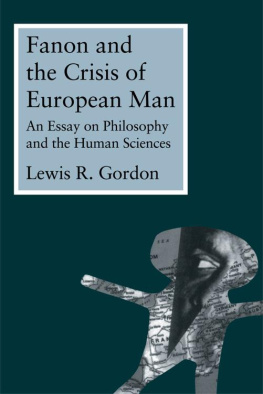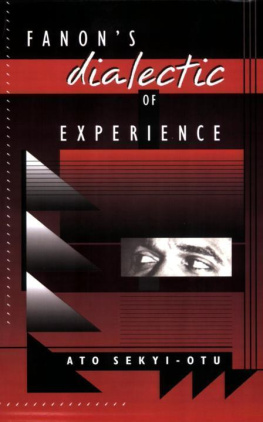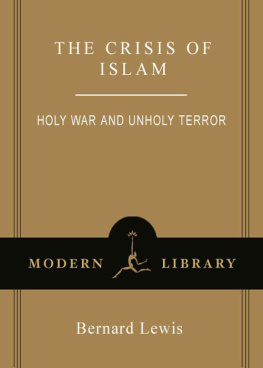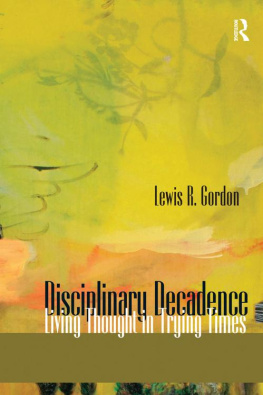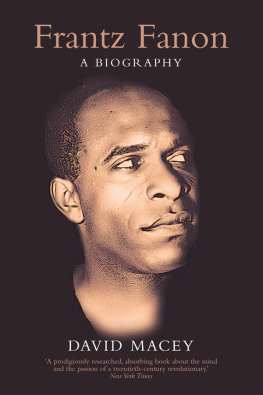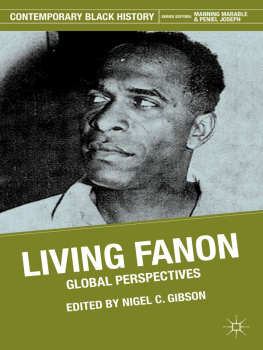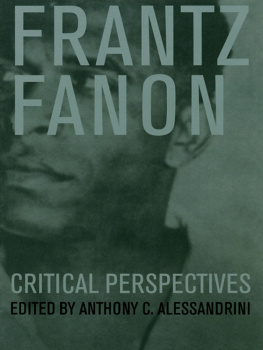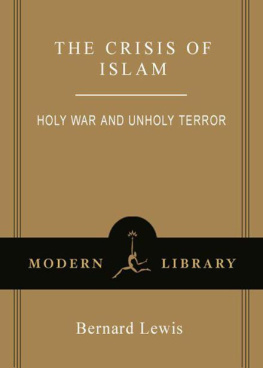Lewis Gordon - Fanon and the Crisis of European Man
Here you can read online Lewis Gordon - Fanon and the Crisis of European Man full text of the book (entire story) in english for free. Download pdf and epub, get meaning, cover and reviews about this ebook. year: 2020, publisher: Routledge, genre: Science. Description of the work, (preface) as well as reviews are available. Best literature library LitArk.com created for fans of good reading and offers a wide selection of genres:
Romance novel
Science fiction
Adventure
Detective
Science
History
Home and family
Prose
Art
Politics
Computer
Non-fiction
Religion
Business
Children
Humor
Choose a favorite category and find really read worthwhile books. Enjoy immersion in the world of imagination, feel the emotions of the characters or learn something new for yourself, make an fascinating discovery.
- Book:Fanon and the Crisis of European Man
- Author:
- Publisher:Routledge
- Genre:
- Year:2020
- Rating:3 / 5
- Favourites:Add to favourites
- Your mark:
- 60
- 1
- 2
- 3
- 4
- 5
Fanon and the Crisis of European Man: summary, description and annotation
We offer to read an annotation, description, summary or preface (depends on what the author of the book "Fanon and the Crisis of European Man" wrote himself). If you haven't found the necessary information about the book — write in the comments, we will try to find it.
Fanon and the Crisis of European Man — read online for free the complete book (whole text) full work
Below is the text of the book, divided by pages. System saving the place of the last page read, allows you to conveniently read the book "Fanon and the Crisis of European Man" online for free, without having to search again every time where you left off. Put a bookmark, and you can go to the page where you finished reading at any time.
Font size:
Interval:
Bookmark:
FANON
and the
Crisis of
European Man
An Essay on Philosophy and the Human Sciences
LEWIS R. GORDON
ROUTLEDGE
New York and London
Published in 1995 by
Routledge
270 Madison Ave,
New York NY 10016
Published in Great Britain in 1995 by
Routledge
2 Park Square, Milton Park,
Abingdon, Oxon, OX14 4RN
Transferred to Digital Printing 2008
Copyright 1995 by Routledge
All rights reserved. No part of this book may be reprinted or reproduced or utilized in any form or by any electronic, mechanical, or other means, now known or hereafter invented, including photocopying and recording, or in any information storage or retrieval system without permission in writing from the publishers.
Library of Congress Cataloging-in-Publications Data
Gordon, Lewis R. (Lewis Ricardo)
Fanon and the crisis of European man: an essay on philosophy and the human sciences
/ Lewis R. Gordon
p. cm.
Includes bibliographical references and index.
ISBN 0-415-91414-0 ISBN 0-415-91415-9
1. Fanon, Frantz, 1925-1961. 2. Phenomenology. 3. Existentialism. 4. EuropeCivilization
20th century. 5. Social sciencesPhilosophy. I. Title.
B1029.F354G67 1995
325'.3'092dc20 95-8756
CIP
Publisher's Note
The publisher has gone to great lengths to ensure the quality of this reprint but points out that some imperfections in the original may be apparent
In Memory of
Frantz Fanon
1925-1961
Patrice Lamumba
1925-1961
El-Haji Malik El-Shabazz
1925-1965
Robert Blair
1964-1994
- ONE
Fanon as Critique of European Man - TWO
Existential Phenomenology and History - THREE
Racism, Colonialism, and Anonymity: Social Theory and Embodied Agency - FOUR
Tragic Revolutionary Violence and Philosophical Anthropology - FIVE
Fanon's Continued Relevance
- ONE
Fanon as Critique of European Man - TWO
Existential Phenomenology and History - THREE
Racism, Colonialism, and Anonymity: Social Theory and Embodied Agency - FOUR
Tragic Revolutionary Violence and Philosophical Anthropology - FIVE
Fanon's Continued Relevance
THIS BOOK was presented by the author at a number of conferences during the spring of 1994. The idea of writing this work on Frantz Fanon, one of the most influential philosophers, psychiatrists, sociologists, and revolutionaries of the twentieth century, grew out of an important conference and three pivotal conversations over the past two years.The conference was the Sixth Biennial Meeting of the Sartre Society of North America, held at Trent University in Peterborough, Ontario. At the conference, I presented a paper that aroused interest in my discussion of Fanons relationship to Jean-Paul Sartre. Some of those ideas were later included in my essay, Sartrean Bad Faith and Antiblack Racism, published in The Prism of the Self: Essays in Honor of Maurice Natanson. An excerpt from that essay appears in the second chapter of this work by permission of Kluwer Academic Publishers.
The first conversation that influenced my decision to write this book preceded the conference, however, by half a year. It was with my colleague and friend, Paget Henry, with whom I have been in correspondence ever since I presented a paper on bad faith and antiblack racism at the Center for the Study of Race and Ethnicity at Brown University during the fall semester of 1992. We have shared work since then and have spoken quite a bit about Fanon. Out of those conversations emerged a special section on Fanon in my first book, Bad Faith and Antiblack Racism.
The second pivotal conversation came out of a correspondence with Bob Stone of Long Island University, who reviewed my first book for publication. His commentary raised some challenges regarding my interpretation of Fanons work. Through our correspondence, he became persuaded by my positions on Fanon and phenomenology and encouraged me to produce a work on those themes.
The third experience was with my colleague, Martin Matutk, whose work, Postnational Identity, marks a recent effort to forge a place for the convergence of existential philosophy and critical theory. We had decided to present works on two central figures in the New LeftI on Fanon, and Martin on Herbert Marcuse. But as we met and sat down to compose our papers, we each came to the realization that we had much more to say than we had bargained for at that time; for such convergences are intimately linked to our philosophical projects, which involve the articulation and defense of a place for the human being in misanthropic times.The consequence was our going with the pitch, and, in my case, developing presentations toward a work in celebration of Fanons seventieth birthday. To this end, I have benefitted from the kindness of a number of individuals and institutions.
Leonard Harris has provided me with opportunities and resources in the presentation of various sections of this book. Early versions of the first and second chapters were presented at the Cultural Studies Collective at Purdue University, the Black Caucuss symposium, Existential Perspectives on Nationality, Race, and Resistance, which was held at the American Philosophical AssociationPacific Division meeting, and the Critical Theory Conference on Democracy and Identity, which was held at the Czech Academy of Science. With regard to these conferences, I would like to thank Grant Snider for the Purdue gig, Leonard Harris and Tommy Lott for the Los Angeles one, as well as my wonderful friend, Mina Choi, for the great time and support in L.A., and, finally, the Purdue Research Foundation for the much-needed funds to travel to Prague. In Prague, Josef Moural of Charles University proved to be a helpful guide and a source of stimulating conversation on phenomenology.
I should also like to note two unexpected circumstances that emerged out of the L. A. and Prague conferences. Antole Anton, who chaired the panel discussion in L.A., wrote a rather interesting editorial to the Proceedings and Addresses of the American Philosophical Association, in which he remarked that if not explicitly critiquingconstitutionalism, the panelists (which included Matutk and Ronald Judy) in the Symposium on Existentialist Perspectives on Race and Nationality were, at least, firmly grounded in the twentieth century. He identified a key dimension of my project when he added: In one way or another, they were all reflecting on the meaning of the practical failures of the liberal state to live up to its own ideals. To what extent, they all seemed to ask in different ways,are liberal categories obsolete? I thank Anton both for chairing the panel and for restating these important questions.
I would like to add how I became acquainted with a wonderful group of Czech philosophers at Charles University. At the main conference held at the Czech Academy of Science, there were dynamics that struck me as indicative of the crisis that will be discussed in subsequent chapters. I presented this work during what has become known in the critical theory circle as the infamous second week, the week reserved for the younger scholars. Most of the older, lite scholars took it upon themselves to depart after their presentations during the first week. In both weeks, only one Czech philosopher participated. Since my philosophical inclinations are more rooted in existential phenomenology and liberation theory, I went to my Czech colleague Martin Matutk's book session at Charles University. That session and our ensuing long conversations on philosophy and politics proved to be the most memorable intellectual dimension of my visit to Prague.
Next pageFont size:
Interval:
Bookmark:
Similar books «Fanon and the Crisis of European Man»
Look at similar books to Fanon and the Crisis of European Man. We have selected literature similar in name and meaning in the hope of providing readers with more options to find new, interesting, not yet read works.
Discussion, reviews of the book Fanon and the Crisis of European Man and just readers' own opinions. Leave your comments, write what you think about the work, its meaning or the main characters. Specify what exactly you liked and what you didn't like, and why you think so.

